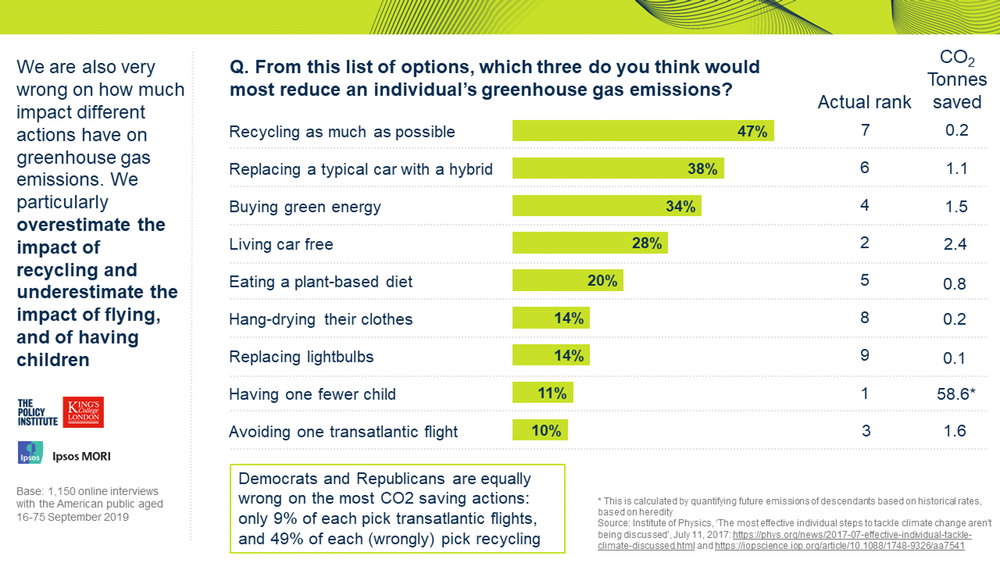By Bobby Duffy/The Conversation
The world is often better and getting better than people think. Murder rates, deaths from terrorism and extreme poverty are all down. Life expectancy, health and education levels are up. But, as I explore in my book Why We’re Wrong About Nearly Everything, people mostly think things are worse than they are and going downhill fast because of the natural tendency of humans to focus on negative stories and forget how bad the past was.
But there is one vital, even existential, exception: People still don’t realize how bad the world’s climate and natural environment have become. Misperceptions about climate change and the ecological crisis are all too clear from a new survey of Americans that tested their understanding of how far the problem has progressed in their lifetimes.
Read more:
What you think you know about the climate is probably wrong – new UK poll
Recycling Will Save Us?
It’s an extraordinary fact that all 20 of the hottest years on record have been in the last 22 years. But when we asked the U.S. public how many of the past 22 years have been among the hottest, the average guess is 14, and only 15% of Americans correctly guess that it is all 20 years. Democrats are somewhat better at getting the right answer (23%) than Republicans (9%), but still fare poorly overall.
It’s understandable that people might be poorly versed in statistics like this, but there’s also confusion over what the biggest causes of warming are. The people we interviewed guessed that 16% of global greenhouse gas emissions come from air travel, when it’s only around 2%. While airplanes emit a lot of CO₂ during each flight, air travel is still relatively infrequent, compared with, say, car journeys.
The rarity of flying explains why, despite aviation’s relatively limited contribution to emissions, one of the most effective actions a person can take is to fly less. A study by Swedish academics puts skipping one transatlantic flight as the third most effective action someone can take, only behind having one less child and living entirely car-free. But only 10% of the U.S. public pick out skipping the flight as one of the top three. Instead, 45% thought recycling as much as possible is a priority for reducing emissions – a much less effective action than giving up just one flight.
And that’s not the only misperception about recycling. People also think much more plastic waste has been recycled than is really the case. Our respondents thought about half of the 6.3 billion tons of plastic waste that has been produced worldwide is now languishing in the environment. Research shows it’s an incredible 79%. People thought that a quarter of plastic waste had been recycled, when it’s only 9%.
 (ENLARGE)
(ENLARGE)
The people we spoke to also didn’t realize just how much wildlife has suffered over the past few decades, and how precipitous the decline in populations has been. Only a quarter of the U.S. public correctly identify that the population sizes of mammals, birds, fish and reptiles in the world have declined by 60% since 1970. Again, Democrats were slightly better than Republicans: 26% selected the correct, terrifying answer, compared with 16% of Republicans.
Information Overload
Despite low engagement with the scale of the problems, people are still worried.
Our new polling also showed that 60% of Americans reject President Donald Trump’s past assertion that global warming is an “expensive hoax” – and instead, 62% agree that the world is facing a “climate change emergency, with the threat of irreversible destruction of our environment in our lifetime.”
But there are huge differences in these attitudes between Republicans and Democrats. Seven in 10 Democrats strongly disagree that global warming is an expensive hoax, compared with just 17% of Republicans. Half of Republicans disagree that the world is facing a climate change emergency, compared with just 6% of Democrats.
Read more:
Deniers vs alarmists? It’s time to lose the climate debate labels
This very different view between party supporters is despite only relatively small differences in perceptions of the reality between the two groups. This shows that attitudes to big issues like climate change are sometimes so tied up with political identity, including attachment to political parties, that understanding the facts is often secondary.
This is a real challenge for those campaigning for climate action. It’s not enough to just provide more facts and expect people to hear them and act, regardless of how extraordinary those facts are.
Bobby Duffy is a professor of public policy and director of the Policy Institute at King’s College London. This post is republished from The Conversation under a Creative Commons license.
See also:
* Florida Keys May Abandon Some Roads To Sea Rise Rather Than Raise Them.
* As Water Runs Low, Can Life In The Outback Go On?
* Climate Change The Cause Of Great Lakes Record High Water – And Earlier Record Lows.
–
Previously:
* On The Origins Of Environmental Bullshit.
* Confirmed: Exxon Knew.
* Shell Knew, Too.
* Hothouse Earth Co-Author: ‘People Will Look Back On 2018 As The Year When Climate Reality Hit.’
* 5 Ways Trump And His Supporters Use The Same Strategies As Science Deniers.
* Climate Science Across America.
* In Fast-Thawing Siberia, Radical Climate Change Is Warping The Earth Beneath The Feet Of Millions.
* Washed Away: Northwest Wisconsin Copes With The Costs Of A Changing Climate.
* Why Is Climate Change Still Not At The Top Of The News Agenda?
* Chicago Lakefront Disappearing And Local Media Can’t Figure Out Why.
–
Comments welcome.
Posted on December 9, 2019



